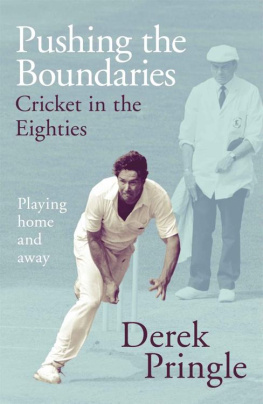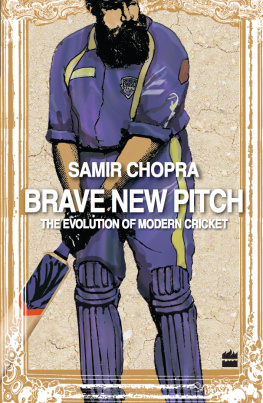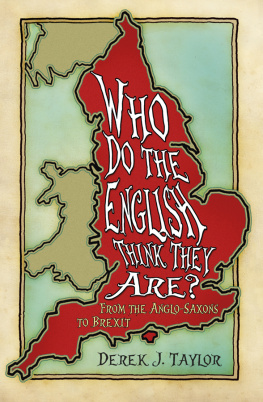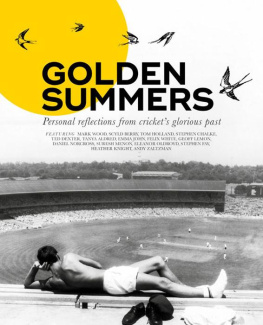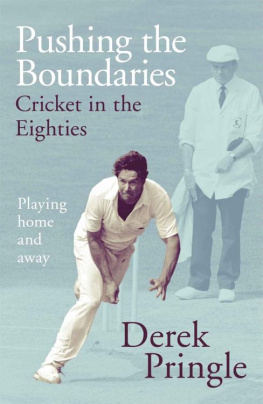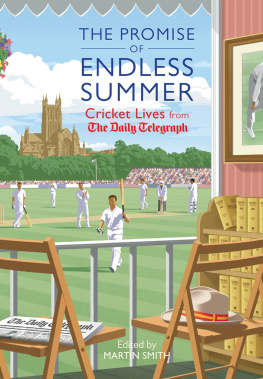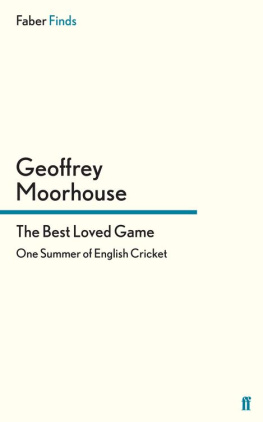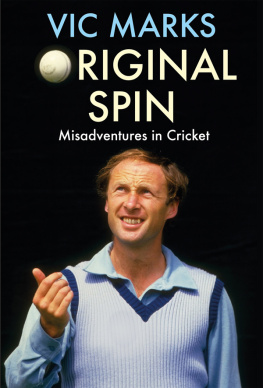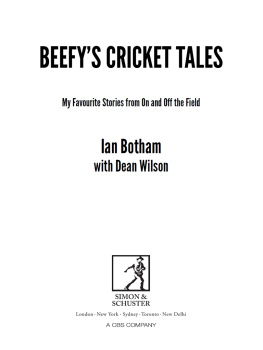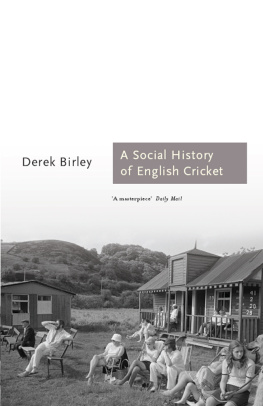Derek Pringle was born and raised in Nairobi, Kenya, where he first learnt to play cricket on matting pitches. He attended St Mary's School, Nairobi, then Felsted School in Essex, before reading Geography and Land Economy at Cambridge, where he captained the university at cricket and won three blues.
While still an undergraduate he was selected to play Test cricket for England in 1982, a feat achieved previously by Ted Dexter, 24 years earlier. He also appeared, briefly, in the Oscar-winning film Chariots of Fire, as Cambridge's vice-captain of athletics.
He played 30 Tests and 44 one-day internationals for England, appearing in two World Cups, one as a losing finalist in 1992. His cricket career at Essex, which spanned 15 years, included five County Championship titles, three John Player League titles, a NatWest Trophy and countless friendships. He retired from the game in 1993.
A second career, as a journalist, saw him appointed cricket correspondent for the Independent, then the Daily Telegraph, a role he fulfilled until 2014. He now works as a freelance writer.
His hobbies include photography and collecting vinyl records, of which he has several thousand - the latter perhaps explaining why he has never married. He has a son whose musical tastes he is trying to shape.

www.hodder.co.uk
First published in Great Britain in 2018 by Hodder & Stoughton
An Hachette UK company
Copyright Derek Pringle 2018
The right of Derek Pringle to be identified as the Author of the
Work has been asserted by him in accordance with
the Copyright, Designs and Patents Act 1988.
All rights reserved. No part of this publication may be reproduced,
stored in a retrieval system, or transmitted, in any form or by any
means without the prior written permission of the publisher, nor be
otherwise circulated in any form of binding or cover other than that
in which it is published and without a similar condition being
imposed on the subsequent purchaser.
A CIP catalogue record for this title is available from the British Library
eBook ISBN 9781473674943
Hodder & Stoughton Ltd
Carmelite House
50 Victoria Embankment
London EC4Y 0DZ
www.hodder.co.uk
Youre up and coming until you are over the hill
Keith Fletcher
For Dad, who sadly saw none of this but handed down the cricket genes.
For Mum and Janet, who put in the overs.
And for my team-mates at Essex CCC. Lets face it, we smashed the Eighties.
Contents
Acknowledgements
I would like to thank David Luxton, who has been urging me to write a book for a while, and Roddy Bloomfield and Fiona Rose at Hodder and Stoughton for their encouragement and hard work. A big thank you is also due to Tim Waller for his helpful suggestions while editing the manuscript and for correcting my often errant maths regarding various scores. This book is mostly about cricket in the 1980s, a now distant decade. Although recalling detail was often a challenge, the following were unfailingly helpful in racking their memories on my behalf:
David Acfield, Winston Bynorth, Steve Church, Chris Cowdrey, Tim Curtis, Phil DeFreitas, Paul Downton, Ray East, Matthew Engel, Keith Fletcher, Graeme Fowler, Pat Gibson, Graham Gooch, Martin Johnson, John Lever, Ken McEwan, Kevin Palmer, Paul Prichard, Chris Pugh, Mike Selvey, Robin Smith, John Stephenson.
Photographic acknowledgements
The author and publisher would like to thank the following for permission to reproduce photographs:
Tony Debenham Collection, Winston Bynorth, Patrick Eagar/Popperfoto/Getty Images, Patrick Eagar/Patrick Eagar Collection via Getty Images, Bob Thomas/Getty Images.
Other photographs from private collections.
Every reasonable effort has been made to trace the copyright holders, but if there are any errors or omissions, Hodder & Stoughton will be pleased to insert the appropriate acknowledgement in any subsequent printings or editions.
Preface
I spent much of the 1980s playing cricket for Cambridge, Essex and England. In itself, representing those three sides was not especially remarkable, except for the decade in which I played. Timing, they say, is everything in sport and playing then was as fortuitous as being first in the queue at the January sales, although in the Eighties just about everything else went too, on and off the field.
Every generation believes their era to be the definitive one but only now, with the clarifying perspective of time, can we see what a bizarre, divisive and defining decade the 1980s really was, especially on the cricket field. It proved a period of flux both fascinating and disorientating as cricketers were suddenly granted access to personal freedoms, only to have them withdrawn as coach culture came in and consolidated itself.
At the start of the Eighties, despite being preceded by decades known as the Swinging Sixties and Sleazy Seventies, cricket still wallowed in a bucolic, sepia-tinged age in which tea ladies ruled and a teams tail began at number eight. Yet, all that changed during a decade in which Margaret Thatcher was the countrys sole Prime Minister. Under her Conservative government, Britain became locked in a battle royal as the old ways lost out to the new in a bid to join the modern world. The biggest changes were social and economic, bringing prosperity to many but also the decline of some treasured institutions. In cricket, it was the maverick player who suddenly became an endangered species.
As an all-round cricketer good enough to play for county and country, I was at the heart of the transformation. From my formative years on the greensward of Fenners with Cambridge University until the fruition of my career with Essex and England I experienced the change in the zeitgeist. It wasnt always pretty but it was a hell of a lot of fun.
With a rich cast of characters like Ian Beefy Botham, Mike Gatting, Phil Edmonds, Bob Willis and Derek Randall for England, along with Keith Fletcher, John Lever, Ray East and Graham Gooch for Essex, all rubbing shoulders with celebrities like Eric Clapton, Elton John and Peter Cook, the decade was rarely dull.
There were thrills, spills and more than the odd catastrophe along the way as cricket went through a transition both painful and comical. As my own experiences in this book will lay bare, few cricketers left the 1980s wealthy, but we did depart rich in experience, with some sparky tales to tell.
It was also a time when the media experienced seismic change. The presss relationship with cricketers altered drastically over the period, as newspapers began to use sport to fight their circulation wars. At the start of the Eighties players could be found carousing with journalists in bars, with an omert observed. But by the end of the decade subpoenas were being served more readily than pints as every peccadillo became fair game for the Fourth Estate.
As in cricket, the more maverick operators among the press corps became hunted men, accountants steadily culling those who racked up expenses to keep their sources sweet and their mistresses even sweeter. Today, media organisations will never again see the likes of a Chris Lander or Martin Johnson, the cricket correspondents of the Independent and the Mirror , with readers the poorer for it.
Those men lived more than a little in the real world rather than on Wikipedia or the Twittersphere and it informed their copy. You only have to read Frank Keatings Guardian reports from Englands tour of India in 198182, where he regularly got drunk with Botham, to see the false economy of todays unenterprising approach.
At the beginning of my career, players mostly liked and trusted the press. That relationship was all but eroded by the time I retired from professional cricket in 1993.
Next page
